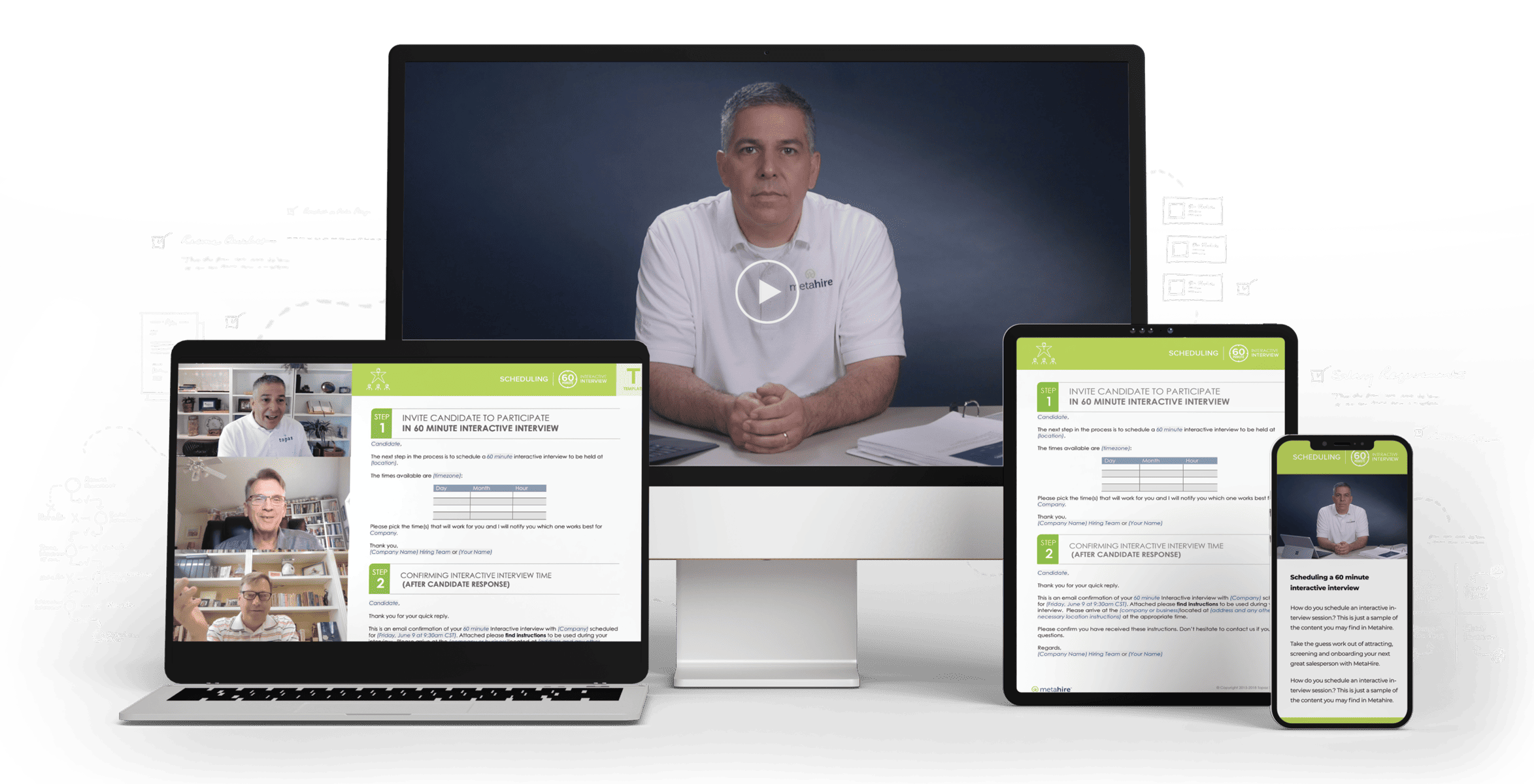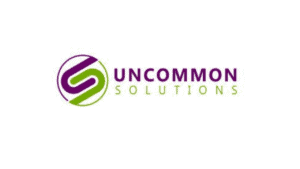Choosing the best sales training company is an investment in your team’s skills, but it can also transform your business’s approach to sales as a whole.
Get it wrong, and you’re stuck with tactics that fail to deliver results how you want them to. Get it right, and you’ll empower your salespeople to build better relationships, uncover buyer pain points, and drive long-term success.
So, how do you find the right custom sales training provider for your team?
Strap in as we share our 9 tried and tested tips to help you find the best sales training company for your team and business.
1. Look for a Firm That Sells Like It Trains
The best sales training company for you to partner with practices what they preach, so consider how they approach you during the sales process.
If they bombard you with pressure tactics, take your sales training provider search elsewhere. Chances are, their training will teach your team the same outdated methods. Pay close attention to the subtleties of their selling process. Are they genuinely interested in understanding your unique challenges or simply trying to close a deal?
Consider how they respond to objections or questions you may have during your initial discussions. A firm that embraces a consultative selling approach would welcome these inquiries as opportunities for dialogue rather than becoming defensive or dismissive.
Their ability to navigate these interactions with professionalism and empathy will signal their readiness to instill the same values within your sales team. In essence, a firm that practices what it preaches will ensure that its training is rooted in authenticity and builds a foundation for success in your organization.
Look for companies that engage you like buyer facilitators who ask thoughtful questions, listen to your needs, and build a relationship with you before trying to move into sending you a proposal or talking about next steps.
Why should you trust their talk if they’re not walking the walk?
2. Don’t Be Fooled by Big Names
Big-name providers come with big promises and price tags but often fail to deliver results tailored to your business.
Why? It’s because they rely on a “one-size-fits-all” approach.
Just because a company has name recognition doesn’t mean they’re the right fit for you. These high-profile firms may offer various resources or well-packaged programs that look impressive on paper. Yet, they frequently lack the personalization required to truly resonate with your sales team.
In essence, prioritize results over reputation.
Choose a provider that aligns with your unique needs and goals. If a training company cannot demonstrate a clear understanding of your business context and articulate how it plans to drive measurable outcomes, it’s best to look elsewhere.
They’re probably not the best sales training company for you, no matter how impressive their brand may be.
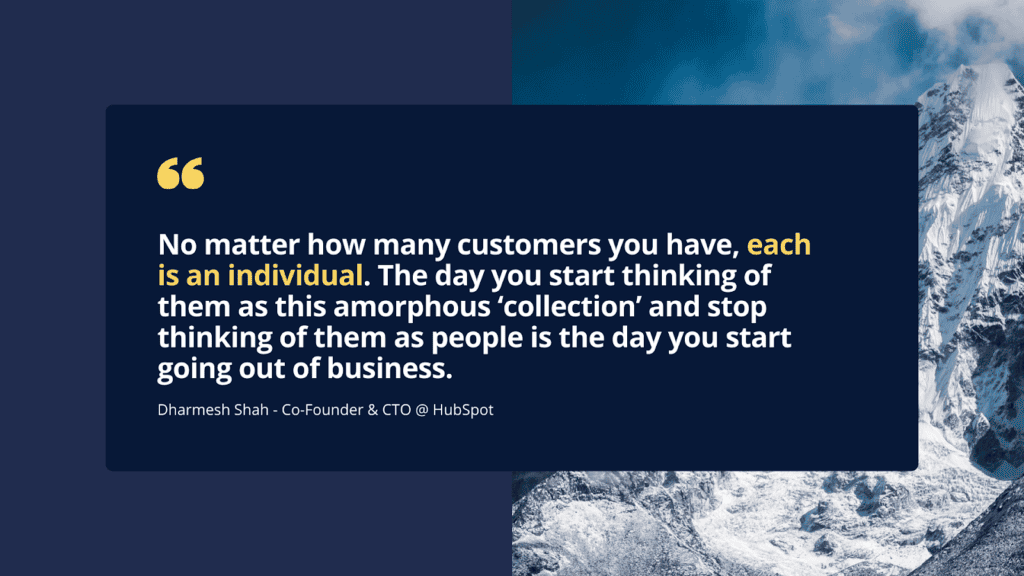
3. Custom Sales Training Beats Cookie-Cutter Playbooks
Sales teams are as unique as the businesses they serve.
For this reason, a generic playbook won’t cut it. The best sales training company for you will design programs tailored to your industry, team dynamics, and customer base.
Ask about customization upfront. If the training can’t be bespoke and built around your team, it’s unlikely to drive meaningful short-term and long-term change.
Custom sales training addresses the specific challenges your sales team faces and enhances engagement by incorporating real-life scenarios and role practices pertinent to your organization. This fosters a deeper understanding of sales techniques, as participants can see how concepts apply directly to their daily interactions.
Personalized sales training can also facilitate better skills retention. Why? Salespeople are likelier to remember and apply concepts they perceive as directly beneficial to hitting their quotas. A tailored approach also allows for ongoing adjustments and refinements based on team performance and feedback. Training methods evolve as your business grows.
Adaptability, flexibility, and creativity make the training experience a strategic investment that yields measurable results and drives a culture of continuous improvement within your sales organization.
4. Prioritize Relationships, Not Closing Tricks

And that’s why traditional sales miss the mark.
Traditional sales training focuses on helping salespeople close deals, while modern sales training assists them in building trust and long-term relationships with their customers.
With this in mind, you’ll want a provider that teaches your team to facilitate conversations, uncover pain points, and create solutions — not one that pushes manipulative closing techniques. Buyer facilitation should be at the core of their methodology. If it is, you know you’ve found the best sales training company for your organization’s needs.
After all, trust and relationships are what keep customers coming back.
5. Avoid One-and-Done Workshops
Beware of training companies that offer a single workshop and call it a day.
Real learning doesn’t happen in a vacuum — it requires reinforcement, follow-up, and ongoing support. The best sales training company for you should offer continuous development, coaching, and tools to ensure the lessons stick throughout your sales process.
Our Buyer Facilitator program runs at a pace that makes the most sense for your sales team but doesn’t just occur in a single session. It’s an extensive, in-depth, and ongoing process of learning, developing, and hard work.
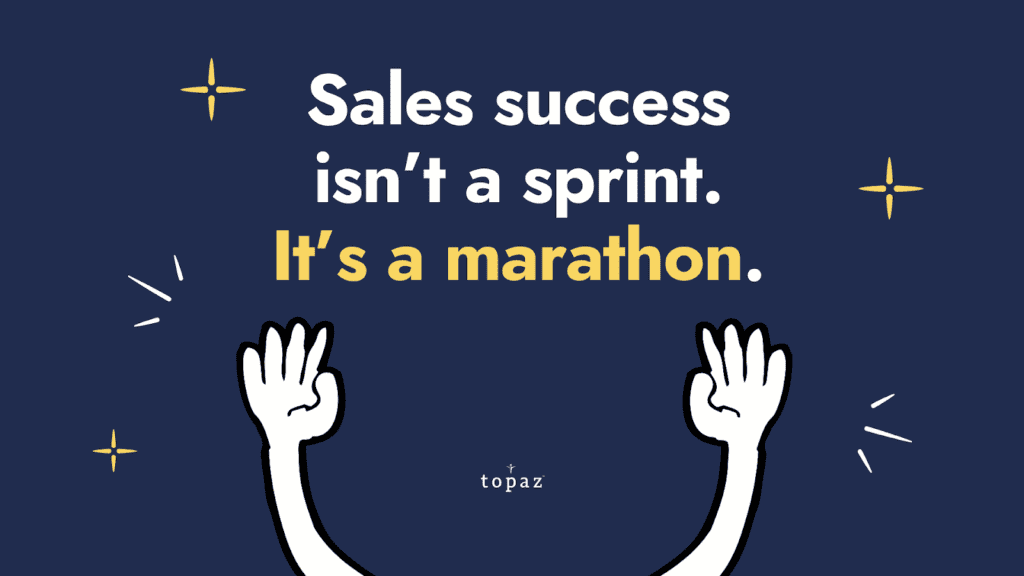
Success stories like these are great examples of the value of consistent, routine, and reliable sales training. Take a look!
6. Check If They Can Also Improve How You Hire for Sales
Great training starts with great people. If a sales training provider doesn’t have the ability to coach you on introducing the proper sales hiring process, you’re missing a critical piece of the puzzle.
You can’t train someone to be self-motivated, resilient, or naturally curious — but you can hire people who already have those traits. That’s why the best sales training companies don’t just offer training. They also help you build a sales hiring process designed to find and hire these high-potential candidates from the start.
Look for providers who can guide you on questions like:
- How do we identify which personality traits are predictive of sales success?
- What interview questions should we be asking to spot these traits in candidates?
- How do we avoid the classic mistake of hiring “good talkers” who underperform in the field?
Sales hiring requires more than surface-level interviews. It involves digging into past behaviors, role-playing scenarios, and utilizing tools like sales evaluations, hiring quizzes, or personality assessments (DISC, anyone?) to spot the high-impact performers who will thrive in your unique sales environment.
If your training provider isn’t coaching you on these hiring fundamentals, you’re likely wasting time, money, and effort hiring and training the wrong people. Hiring better salespeople from the start makes your entire sales operation more effective.
Let’s get real: If you’re hiring based on gut feelings, you’re setting yourself up for costly mistakes.
Modern sales hiring should be methodical, data-driven, and focused on behavioral attributes that predict success. Our proprietary hiring system, Metahire, does precisely that. It teaches leaders how to identify top performers before they’re even hired, and it aligns perfectly with our sales training philosophy.
If a training provider can’t help you do this, they’re not thinking about the bigger picture.
7. Make Sure They Train Leaders, Too
Yes, your frontline sales crew will be the tip of your business spear. But let’s be clear: your team’s sales leadership is the backbone of your sales force. Without strong leaders, even the most skilled sales reps struggle to stay focused, motivated, and aligned with the broader strategy.
A great sales training provider knows that true transformation starts at the top. Sales leaders don’t just set quotas and run meetings — they coach, inspire, and problem-solve in real-time. If your provider isn’t offering dedicated training for sales managers, directors, or team leads, you’re missing a massive opportunity for growth.
Leadership training should cover essential skills like delivering effective feedback, guiding reps through the transition from traditional sales to buyer facilitation, and setting strategic goals that drive team-wide accountability. It should also emphasize emotional intelligence, adaptability, and conflict resolution — all key components of high-impact leadership.
When modern sales leaders have the tools to coach and develop their reps, the entire team performs better. This ripple effect strengthens your entire sales organization and creates a culture of continuous improvement.
Pro tip: Look for a provider that sees leadership development as an ongoing process.
8. Find Out How the Sales Training Company Measures Success
It’s easy for a sales training company to track participation and attendance, but those metrics don’t tell you much about whether the training actually works.
A quality provider should be able to measure the impact of their training in meaningful ways that go beyond checking boxes. While they can’t track your team’s revenue performance directly, they can (and should) provide methods to gauge progress where it matters most.
Here are three key indicators of success you should look for in a sales training provider:
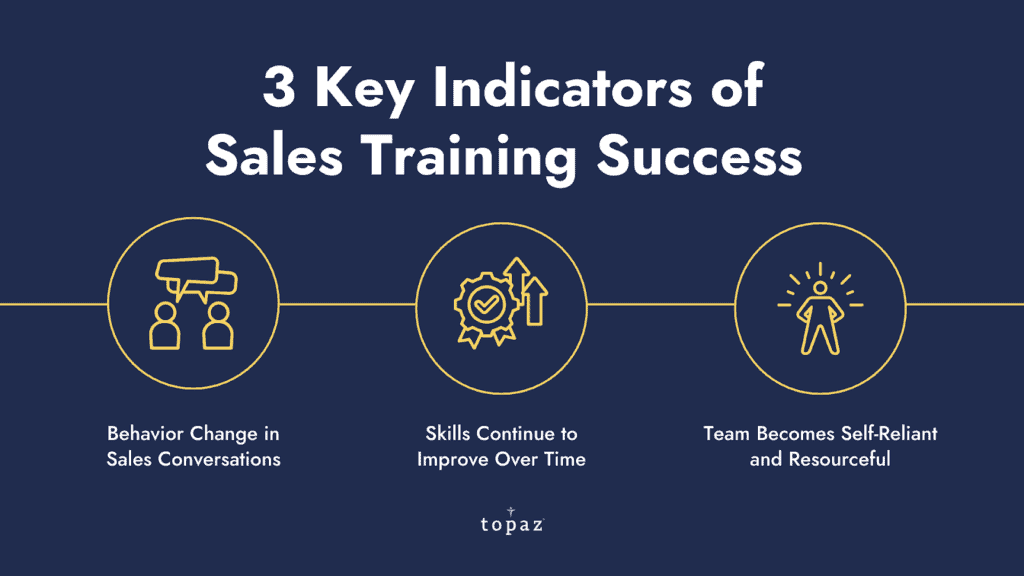
Behavior Change in Sales Conversations
If training is effective, your sales reps should sound different on calls.
Are they asking more substantial discovery questions? Are they confidently navigating objections? Are they making sure each meeting ends with clear next steps?
Sales training companies should offer post-training evaluations, role-plays, or call reviews to assess these shifts. The goal is to ensure reps aren’t just learning in theory — they’re applying it in practice. Look for a company that provides a way to measure observable, tangible shifts in your team’s approach to sales conversations.
Skills Continue to Improve Over Time
Skills fade over time if they aren’t reinforced. Especially things like prospecting, follow-up,
The best training company for you will ensure that skills are learned and, more importantly, applied long after the training session ends.
Do they offer follow-up coaching sessions? Do they provide assessments, quizzes, or opportunities to practice?
These tools help you track whether your team is applying new skills on the job and seeing improvement as a result. Providers that offer role-plays, live call evaluations, or self-assessments create the opportunity for continuous improvement rather than one-and-done workshops.
Team Becomes Self-Reliant and Resourceful
No training provider can track your reps’ individual deal sizes or customer retention, but they should equip your team with the tools to do it themselves.
Look for training companies that provide self-assessment guides, post-training reflection exercises, downloadable guides, or frameworks for ongoing improvement. Can your reps evaluate their performance after a call? Do your sales managers have the resources to coach their team on skill gaps? These tools keep training relevant and create a culture of continuous growth, even after the provider is gone.
The best sales training companies don’t just “teach and leave.” They provide ways for your team to measure its own growth, reinforce new skills, and ensure that knowledge sticks. If a provider can’t tell you how to track meaningful outcomes from their training, they probably don’t have a system that works.
9. Watch How They Ask Questions (Not Just Pitch Their Service)
How a training company sells to you is a preview of how they’ll teach your team to sell.
Do they take the time to understand your challenges, goals, and team dynamics?
Or do they dive straight into a pitch?
The best sales training company will ask thoughtful, probing questions that make you reflect on your needs. If they only talk about themselves, they’re not focused on helping you.
Key Takeaway: Choose better, sell better
Finding the best sales training company isn’t about picking the flashiest name or the cheapest option — it’s about choosing a partner that understands your business, aligns with your values, and transforms your sales team for the long haul.
Use these 9 tips to cut through the noise and find a provider that delivers lasting impact.
When you’re ready to think differently about sales training, we’re just a consultation call away. At Topaz, we help you hire, lead, and sell smarter. Let’s start a conversation and see how we can supercharge your sales team’s success.
FAQ: Finding the Best Sales Training Company
1. What should I look for when choosing a sales training company?
When choosing a sales training company, focus on how they sell to you during the process. Do they ask insightful questions, listen to your needs, and build a relationship before offering a solution? Prioritize providers that offer customized training, coach sales leadership as well as frontline reps, and focus on relationship-based selling rather than outdated “closing tactics.” Look for transparency about how they measure success and ensure they offer follow-up support beyond a one-and-done workshop.
2. How do I know if a sales training program is worth the investment?
The value of a sales training program lies in its ability to drive long-term behavioral change, not just surface-level knowledge. Look for programs that offer ongoing reinforcement, role-play scenarios, and coaching for both reps and leadership. A strong training company will also be able to provide case studies, testimonials, or ROI metrics that demonstrate their ability to create lasting impact. If they can’t articulate how they’ll measure success, that’s a red flag.
3. Why is customization important in sales training?
Customization ensures that the training addresses the unique challenges of your sales team and industry. A one-size-fits-all approach fails to consider your team’s specific pain points, target markets, and selling environments. Custom training allows for role-plays and scenarios that match your actual sales interactions, making the lessons stick. Without customization, the concepts feel too abstract, and reps are less likely to apply them on the job.
4. What’s the difference between sales training for reps vs. sales training for leaders?
Sales reps are trained to develop the skills to engage, persuade, and facilitate buyer decisions, while sales leaders are trained to coach, motivate, and lead their teams. Leadership training often focuses on how to provide feedback, guide team development, and set effective sales strategies. Without proper leadership training, even a highly skilled team can fall flat due to mismanagement or poor guidance. Look for training providers that offer specific tracks for both reps and leaders.
5. How do I measure the impact of a sales training program?
While you may not be able to directly attribute revenue growth to training alone, you can measure impact in several ways. Look for observable changes in how reps conduct calls, handle objections, and guide buyer conversations. Track skills development through role-plays and call reviews. Monitor performance indicators like increased deal size, improved close rates, and stronger customer retention. The best sales training companies offer follow-up support and self-assessment tools to help you track these outcomes over time.
6. How can I tell if a sales training company is the right fit for my business?
The best sales training companies will align with your values, selling philosophy, and team goals. Watch how they interact with you during the sales process — are they asking insightful questions, or are they just pitching their services? Look for companies that prioritize long-term development, offer ongoing coaching, and provide transparent metrics for success. If their style and philosophy match your company culture, they’re more likely to be a good fit for your team.
7. Can a sales training company also help us with hiring better sales reps?
Some training providers do offer support for sales hiring, but not all of them. The best providers recognize that great training starts with great people. They can coach you on how to build a hiring process that identifies top candidates based on personality traits, skills, and resilience — not just experience. This often includes guidance on interview questions, behavioral assessments, and role-play exercises that reveal a candidate’s true capabilities. If hiring better salespeople is a priority for you, ask potential providers if they offer sales hiring support.

